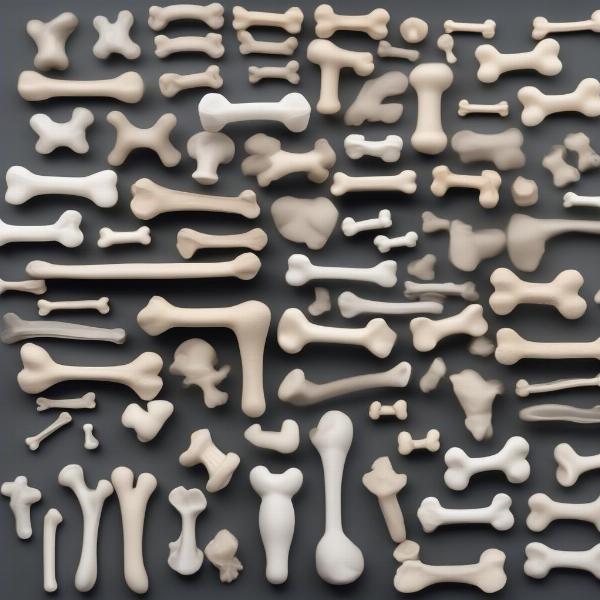Nylon dog bones are a popular chew toy, but their safety is a topic of much debate among dog owners. Understanding the potential risks and benefits of these chew toys is essential for making informed decisions about your dog’s health and happiness. This article will delve into the safety aspects of nylon dog bones, helping you determine if they’re a suitable choice for your furry friend.
Understanding Nylon Dog Bones
Nylon dog bones are made from a synthetic polymer known as nylon. They are designed to be durable and long-lasting, providing dogs with a satisfying chewing experience. The hardness and texture of nylon bones can help clean teeth and satisfy a dog’s natural chewing instincts. However, some concerns surround their safety.
Potential Risks of Nylon Dog Bones
One of the primary concerns with nylon dog bones is the potential for splintering. As dogs chew on the bone, small pieces can break off and be swallowed. These splinters can cause gastrointestinal issues like choking, blockage, or internal injuries. Another concern is the hardness of the nylon, which can lead to tooth fractures, especially in aggressive chewers.
Some dogs may also experience allergic reactions to the nylon material. These reactions can manifest as skin irritation, itching, or digestive upset. While less common, it’s still a possibility to consider.
Are There Benefits to Nylon Dog Bones?
Despite the potential risks, nylon dog bones can offer certain benefits. The chewing action can help scrape away plaque and tartar buildup, promoting better dental hygiene. The durability of nylon bones can also be appealing to owners of dogs who quickly destroy other chew toys. This longevity can make them a more economical choice in the long run. For dogs who enjoy chewing, these bones can provide a satisfying outlet for their natural instincts, helping to prevent destructive chewing behavior directed towards furniture or other household items.
Choosing the Right Nylon Dog Bone
If you decide to give your dog a nylon dog bone, choosing the appropriate size and shape for your dog’s breed and chewing habits is crucial. Supervise your dog while they are chewing on the bone and inspect it regularly for signs of wear and tear. Replace the bone immediately if it becomes splintered or damaged. Opt for nylon bones specifically designed for dogs, avoiding those intended for other animals.
 Different sizes of nylon dog bones for various dog breeds
Different sizes of nylon dog bones for various dog breeds
Alternatives to Nylon Dog Bones
Several safer alternatives to nylon bones exist. Natural rubber toys, such as those made from KONG, are durable and flexible, minimizing the risk of splintering. Treat-dispensing toys can also keep dogs entertained and engaged, providing a mental challenge alongside a chewing outlet. Edible chews made from natural ingredients like bully sticks or rawhide (always supervise with rawhide) can also be a good option, providing a satisfying chew and a tasty treat.
Conclusion
While nylon dog bones can offer some benefits like dental cleaning and long-lasting chewing satisfaction, the potential risks associated with splintering, choking, and tooth fractures should be carefully considered. By understanding these risks and taking appropriate precautions, you can make an informed decision about whether nylon bones are a suitable choice for your furry companion. Always prioritize your dog’s safety and well-being when selecting chew toys.
FAQ
- What should I do if my dog swallows a piece of a nylon bone? Immediately contact your veterinarian.
- Are all nylon dog bones the same? No, they vary in size, shape, and durability.
- How often should I replace my dog’s nylon bone? Replace it as soon as you see signs of wear or damage.
- Can puppies chew on nylon bones? It’s generally best to avoid nylon bones for puppies due to their developing teeth.
- What are some other safe chew toys for my dog? Natural rubber toys, treat-dispensing toys, and edible chews are good alternatives.
- Are nylon bones recommended for aggressive chewers? No, aggressive chewers are more likely to splinter and swallow pieces.
- Can nylon bones help with my dog’s teething? Teething puppies should be given specifically designed teething toys, not nylon bones.
ILM Dog: Your Partner in Canine Care
ILM Dog is your trusted source for expert advice on all aspects of dog care and wellbeing. We offer practical guidance on dog breeds, health, training, nutrition, grooming, activities, and much more. Whether you’re a new dog owner or a seasoned pro, we have the information you need to provide your furry friend with the best possible care. Reach out to our team of experts for personalized advice. Contact us at [email protected] or +44 20-3965-8624.